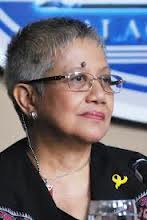MILF to help in dismantling private armies in Mindanao
- Details

COTABATO CITY, Philippines - Local sectors want Presidential Adviser on the Peace Process Teresita Quintos-Deles to forge ahead with government's plan to involve the Moro Islamic Liberation Front in dismantling private armed groups in the South, convinced it will help enhance the rebel group’s capacity to secure the supposed territory of the Bangsamoro region.
Under the 1997 Agreement on General Cessation of Hostilities, the GPH and MILF panels are to mutually cooperate in addressing peace and security issues in flashpoint areas in Mindanao to ensure the cordiality of the peace talks and prevent criminals and terrorists from seeking sanctuary in rebel territories covered by the ceasefire pact.
“This is something we need to support. If we want good, pro-people politics to reign in the Autonomous Region in Muslim Mindanao, we need to take out all private armies in the area,” said the ARMM’s acting governor, Mujiv Hataman, referring to the announcement of Deles about a plan to tap the MILF in the government’s effort to curb private armed groups in the South.
The ARMM had an extensive general re-registration of voters in the entire region from July 9-18 as part of the effort to remove multiple, underage and non-existent registrants in the area’s old book of voters- an initial step meant to ensure honest and peaceful May 2013 elections in the region.
Past regional political exercises in the ARMM were marred by intimidation of voters by private armed groups identified with political warlords, vote-buying, and other irregularities.
“You don’t just talk about the arms of the MILF, but also of everyone else. That is part of normalization. How can you ask the MILF to completely disarm if other groups or some families are armed?” Deles said in an emailed statement.
“We are looking for a real partnership among the government, the MILF, and other governance constituencies to look at this matter on how to make life more secure, to trust in the state forces to make them secure, and be engaged in other productive activities,” she said.
Deles said both parties would also work in partnership to reduce and control firearms in the region.
A convenor of more than 50 peace advocacy outfits in Mindanao, Oblate priest Eliseo Mercado, Jr. said involving the MILF in the government’s campaign against Mindanao-based private armies and armed groups being employed by some clans as “tools” for perpetuating power can also be a good “capacity building exposure” for the rebel group.
Mercado, executive director of the Institute for Autonomy and Governance, said it is also good for the government and the MILF to start working together in maintaining peace and order in many hostile areas while both sides are still trying to iron out a final peace deal based on the objectives of the October 15, 2012 Framework Agreement on Bangsamoro, or FAB.
Mercado said the government and MILF can cooperate on initiatives, including community-organizing thrusts and settlement of conflicts involving Moro families.
The FAB also aims to decommission guerilla forces and turn them into productive sectors once a final GPH-MILF peace compact is achieved.
“As put in the Bangsamoro Framework Agreement, decommissioning is phased and calibrated and will start once political commitments are delivered…We agreed that substantial decommissioning happens when the basic law is delivered,” Deles said.
She said a joint normalization committee will be formed between the parties toward full decommissioning, and will be overseen by a third-party monitor composed of domestic and international partners of the peace process.
“It was understandable that for a movement like the MILF, which had been fighting for so long, its members would have a different perspective on decommissioning,” Deles said.
She said she is confident that decommissioning would be successful here as in other countries.
“As the fighters see this on the ground, peace is real, the land can be cultivated, there is livelihood coming in, children can go to school, health centers will be set up. It will be a matter of not just giving up something, but (they) will also get a better life for (their) children,” she said.
She said discussions on the decommissioning process are underway.
Deles assured the public that the government is determined to deliver the political commitments embodied in the FAB.
Major Gen. Caesar Ronnie Ordoyo, the commander of the Army’s 6th Infantry Division in Central Mindanao, and the ARMM’s police director, Chief Supt. Mario Avenido, both said they do not have any problem working with the MILF, with the guidance of the government’s peace panel and OPAPP, in deactivating private armed groups.
Ordoyo said the 6th ID is ready to help in any initiative meant to address the presence of armed partisans in the division’s so called “area of responsibility,” or AOR.
Avenido said one security concern the ARMM police and the MILF can help address together is the settlement of existing “rido,” or clan wars involving political clans in the autonomous region.
There are about a hundred standing family feuds involving in the ARMM, mostly precipitated by land conflicts, affronts to clan pride and honor, and politics.
Avenido and his subordinate provincial police directors have settled more than 30 clan wars in the past 12 months, according to reports obtained from the ARMM regional police headquarters at Camp S.K. Pendatun town in Maguindanao.
The ARMM covers Maguindanao and Lanao del Sur, both in mainland Mindanao, the island provinces of Basilan, Sulu and Tawi-Tawi, and the cities of Marawi and Lamitan, where residents have a strong tradition of collecting firearms, including military-type assault rifles and shoulder-fire grenade launchers, both as "status symbol" and for protection from rival clans.

